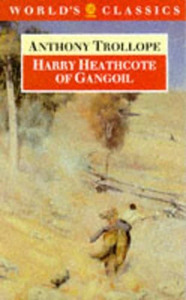
Sheep-farming in the Australian outback might seem like an odd topic for Trollope, an author known best for his forensic analysis of English society. In fact, he spent some time there after his son Fred became a “squatter”. Squatters were settlers who appropriated huge swathes of uncultivated bushland, initially illegally, and later under license from the Crown. Those who possessed the necessary tenacity and acumen could amass immense wealth, enabling them to build flashy houses and emulate the landowning classes of the motherland. Unfortunately, Fred Trollope seems to have suffered a want of pluck and application, and ended up losing thousands of his father’s hard-earned pounds.
If not remunerative, Trollope Père’s adventures did at least irrigate the fertile plains of his imagination. He embraced the dubious sport of kangaroo hunting, although was less enamoured of the Australian refusal to observe social niceties. Keen to maintain standards, the Trollopes had taken their cook with them, who repaid them by running off with a bushman at the first opportunity. Any chance of forming a beautiful relationship between the two countries was scuppered when a bitter Trollope subsequently denounced his antipodean acquaintances in a series of distinctly snotty articles for the Daily Telegraph.
The hero of Harry Heathcote of Gangoil (1874) is based partly on Fred Trollope. Heathcote is a young Englishman who has leased 120,000 acres of Gangoil bush from the Australian government to graze his 30,000 sheep. His anger is roused when neighbour Giles Medlicot purchases the land between Gangoil and the river to build a sugar plantation. Further animosity arises when some men dismissed by Heathcote go to work for Medlicot. Heathcote convinces himself that they are planning to destroy his land and accordingly he treats them in a high-handed manner, thereby increasing the enmity. Matters are not helped when Medlicot has the audacity to fall in love with Heathcote’s sister-in-law. When the Brownbie gang arrives intent on destruction, there is a bitter skirmish and Heathcote finally realises who his true friends are.
Heathcote’s growing sense of paranoia is brilliantly drawn. He is suspicious of everybody and everything, anxiously pacing his territory during the prolonged dry season, just in case someone is careless with a Swan Vesta. His inability to trust anyone almost brings about his downfall, and redemption occurs only when he resolves to challenge his prejudices.
There is little of Trollope’s caustic wit. Instead, he develops a minatory atmosphere and builds the tension, in a style reminiscent of Magnus Mills’ black humour. In that respect, Harry Heathcote is more akin to The Fixed Period than any of Trollope’s other novels. The economical style and dramatic setting make for a refreshing and exciting excursion to the other side of the world.
Harry Heathcote of Gangoil by Anthony Trollope